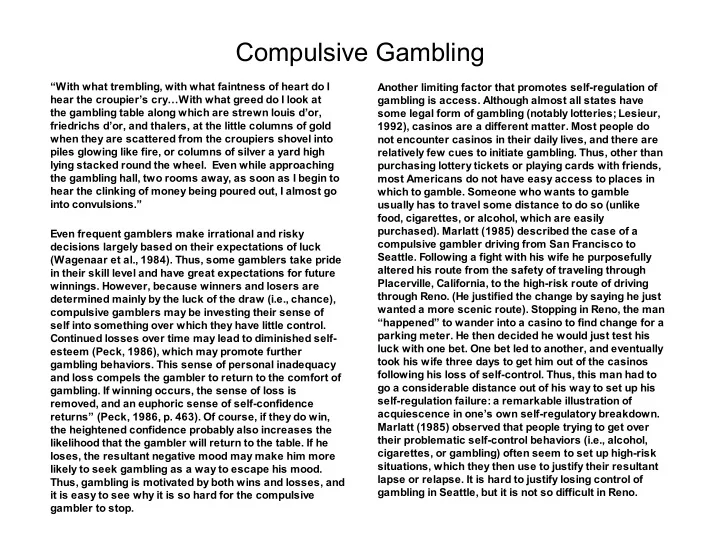

Compulsive Gambling “With what trembling, with what faintness of heart do I Another limiting factor that promotes self-regulation of hear the croupier’s cry…With what greed do I look at gambling is access. Although almost all states have the gambling table along which are strewn louis d’or, some legal form of gambling (notably lotteries; Lesieur, friedrichs d’or, and thalers, at the little columns of gold 1992), casinos are a different matter. Most people do when they are scattered from the croupiers shovel into not encounter casinos in their daily lives, and there are piles glowing like fire, or columns of silver a yard high relatively few cues to initiate gambling. Thus, other than lying stacked round the wheel. Even while approaching purchasing lottery tickets or playing cards with friends, the gambling hall, two rooms away, as soon as I begin to most Americans do not have easy access to places in hear the clinking of money being poured out, I almost go which to gamble. Someone who wants to gamble into convulsions.” usually has to travel some distance to do so (unlike food, cigarettes, or alcohol, which are easily purchased). Marlatt (1985) described the case of a Even frequent gamblers make irrational and risky compulsive gambler driving from San Francisco to decisions largely based on their expectations of luck Seattle. Following a fight with his wife he purposefully (Wagenaar et al., 1984). Thus, some gamblers take pride altered his route from the safety of traveling through in their skill level and have great expectations for future Placerville, California, to the high-risk route of driving winnings. However, because winners and losers are through Reno. (He justified the change by saying he just determined mainly by the luck of the draw (i.e., chance), wanted a more scenic route). Stopping in Reno, the man compulsive gamblers may be investing their sense of “happened” to wander into a casino to find change for a self into something over which they have little control. parking meter. He then decided he would just test his Continued losses over time may lead to diminished self- luck with one bet. One bet led to another, and eventually esteem (Peck, 1986), which may promote further took his wife three days to get him out of the casinos gambling behaviors. This sense of personal inadequacy following his loss of self-control. Thus, this man had to and loss compels the gambler to return to the comfort of go a considerable distance out of his way to set up his gambling. If winning occurs, the sense of loss is self-regulation failure: a remarkable illustration of removed, and an euphoric sense of self-confidence acquiescence in one’s own self-regulatory breakdown. returns” (Peck, 1986, p. 463). Of course, if they do win, Marlatt (1985) observed that people trying to get over the heightened confidence probably also increases the their problematic self-control behaviors (i.e., alcohol, likelihood that the gambler will return to the table. If he cigarettes, or gambling) often seem to set up high-risk loses, the resultant negative mood may make him more situations, which they then use to justify their resultant likely to seek gambling as a way to escape his mood. lapse or relapse. It is hard to justify losing control of Thus, gambling is motivated by both wins and losses, and gambling in Seattle, but it is not so difficult in Reno. it is easy to see why it is so hard for the compulsive gambler to stop.
Misregulation - distortion in self-knowledge Underregulation - strength; failure to self-monitor Misregulation - gambler’s fallacy Underregulation - psychology inertia ACTION-PLAYING (winning; excitement) ANTICIPATION WITHDRAWAL (relief of problems) (losing; desperation) • NEGATIVE AFFECTIVE STATE • (depression; low self-esteem) Misregulation - Strength Distortion
Diagnostic Criteria for 312.31 Pathological Gambling A. Persistent and recurrent maladaptive gambling behavior as indicated by five (or more) of the following: (1) is preoccupied with gambling (e.g., preoccupied with reliving past gambling experiences, handicapping or planning the next venture, or thinking of ways to get money with which to gamble) (2) needs to gamble with increasing amounts of money in order to achieve the desired excitement (3) has repeated unsuccessful efforts to control, cut back, or stop gambling (4) is restless or irritable when attempting to cut down or stop gambling (5) gambles as a way of escaping from problems or of relieving a dysphoric mood (e.g., feelings of helplessness, guilt, anxiety, depression) (6) after losing money gambling, often returns another day to get even ("chasing" one's losses) (7) lies to family members, therapist, or others to conceal the extent of involvement with gambling (8) has committed illegal acts such as forgery, fraud, theft, or embezzlement to finance gambling (9) has jeopardized or lost a significant relationship, job, or educational or career opportunity because of gambling (10) relies on others to provide money to relieve a desperate financial situation caused by gambling B. The gambling behavior is not better accounted for by a Manic Episode
Gambling Dependence (Pathological Gambling) DSM-IV- Three or more symptoms occurring during the last year 1. Tolerance ( 2. needs to gamble with increasing amounts of money) 2. Withdrawal (4. is restless or irritable when attempting to cut down or stop gambling; 5. gambles as a way of escaping from problems or a dysphoric mood) 3. Larger amounts (6. After losing money gambling, often returns another day to get even-”chasing”) 4. Impaired control- (2. has repeated unsuccessful efforts to control, cut back or stop gambling) 5. Time spent- (1. Is preoccupied with gambling) 6. Neglect of activities- (9. has jeopardized or lost a significant relationship, job or career opportunity because of gambling) 7. Continued use despite problems- (7. Lies to family members or others to conceal the extent of gambling 8. Has committed illegal acts to finance gambling; 10. Relies on others to provide money to relieve a desperate financial situation caused by gambling) From: American Psychiatric Association, Diagnostic and Statistical Manual of Mental Disorders, 4th edition, American Psychiatric Press, Washington DC, 1994.
Recommend
More recommend